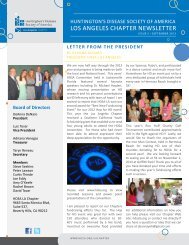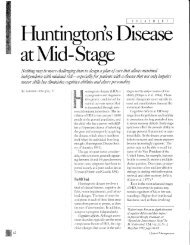Understanding Behavior in HD.final.8-18-05 - Huntington's Disease ...
Understanding Behavior in HD.final.8-18-05 - Huntington's Disease ...
Understanding Behavior in HD.final.8-18-05 - Huntington's Disease ...
Create successful ePaper yourself
Turn your PDF publications into a flip-book with our unique Google optimized e-Paper software.
8<br />
HOW CAN INDIVIDUAL FACTORS CONTRIBUTE TO<br />
BEHAVIOR DIFFICULTIES IN <strong>HD</strong>?<br />
UNIQUE PERSONALITY<br />
Although sometimes it might seem that it would be easier if all people with <strong>HD</strong> were exactly the same,<br />
hav<strong>in</strong>g <strong>HD</strong> fortunately does not take away <strong>in</strong>dividuality.<br />
We Are All Unique: Joan’s Story<br />
Alice, a staff member <strong>in</strong> a nurs<strong>in</strong>g home, was rearrang<strong>in</strong>g the night table of Joan, a<br />
woman with Hunt<strong>in</strong>gton’s disease. Joan had been busy <strong>in</strong> the adjo<strong>in</strong><strong>in</strong>g bathroom while<br />
Alice tidied up her room and threw away some wilted flowers on the night table.<br />
Suddenly, without warn<strong>in</strong>g, Joan leaped out of the bathroom and wrestled Alice to the<br />
floor. Joan attacked her with such force that Alice was sent to the hospital. The staff at<br />
the nurs<strong>in</strong>g home agreed that this was a product of the irritability and aggression of<br />
Hunt<strong>in</strong>gton’s disease.<br />
Unfortunately, this staff’s <strong>in</strong>terpretation of the aggressive outburst is not uncommon. The disease is not<br />
the person, however. All <strong>in</strong>dividuals have a history and a life course. They have personal experiences and<br />
objectives and it is important to pay attention to how the disease has <strong>in</strong>terfered with the <strong>in</strong>dividual’s life. It<br />
turned out that the bouquet of wilted flowers was the only gift Joan had received from her son that year. Their<br />
removal by Alice was the source of her anger. Her response was certa<strong>in</strong>ly exaggerated, but the nurs<strong>in</strong>g staff<br />
viewed her behavior quite differently know<strong>in</strong>g the full story. “When we see th<strong>in</strong>gs <strong>in</strong> a new way, we can<br />
<strong>in</strong>tervene <strong>in</strong> a different way,” says Dr. Allen Rub<strong>in</strong>, who shared this story.<br />
When an <strong>in</strong>dividual is diagnosed with <strong>HD</strong>, it is important to remember that there is still a person, an<br />
<strong>in</strong>dividual, beh<strong>in</strong>d the <strong>HD</strong>. Oftentimes, the diagnosis of <strong>HD</strong> is all the caregiver pays attention to, and the<br />
personality of the <strong>in</strong>dividual is neglected.<br />
STAGE OF ILLNESS<br />
The type, frequency, and severity of behavioral problems that occur often vary with stage of illness. One<br />
survey suggestes that persons with early <strong>HD</strong> are more concerned about depression, anxiety, and apathy, whereas<br />
persons with later-stage <strong>HD</strong> report agitation, irritability, and dis<strong>in</strong>hibition as the most prom<strong>in</strong>ent behavioral<br />
concerns. The ways of respond<strong>in</strong>g to the various stages of <strong>HD</strong>, however, can vary greatly from person to<br />
person. It is usually helpful to consider what stage of illness the <strong>in</strong>dividual is <strong>in</strong> to better understand the<br />
behaviors that occur.<br />
Based upon the rat<strong>in</strong>g of Total Functional Capacity (TFC; Shoulson, 1981), patients are considered to be<br />
<strong>in</strong> one of five stages of the <strong>HD</strong> illness. In general, descriptions of the stages are as follows:

















